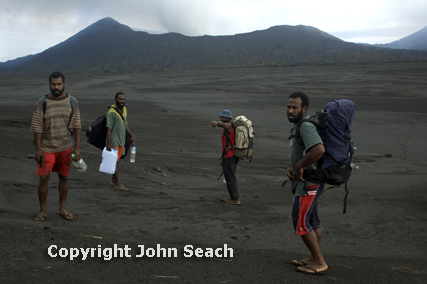Ambrym Volcano
ambrym.com
Ambrym Volcano | John Seach
Jewel of the Pacific

Ambrym is famous for the lava lakes which regularly appear in the summit craters. The first records of activity were in 1774 when Cook viewed emissions during his second round the world voyage. The volcano was first climbed in the late 1800's and produced destructive eruptions in 1894, 1913, 1929, and 1951. During the 1980's and 1990's activity included lava lakes in the summit craters.
Ambrym volcano is unusual because it produces basaltic lava in a subduction zone. The island is subjected to cultural restrictions which limit access to the volcano and cetrain times of the year. It is important to travel with an experienced guide, who has permission and knowledge to access the volcano. Conditions on the volcano may be severe at times, and proper planning and equipment is required for a successful expedition.

Ambrym Volcano - John Seach
Ambrym Volcano
16.25 S, 168.12 E
summit elevation 1334 m
Pyroclastic Shield Volcano
Ambrym contains two large cones, Benbow and Marum, and 3 smaller active craters. Lava lakes appear in Benbow and Mbwelesu craters. Marum crater has not erupted for over 60 years.
In 1913-14 Ambrym volcano produced one of the largest eruptions in Melanesia in 400 years. A destructive eruption occurs about every 20 years.
History of Ambrym
Bougainville was the first European explorer to see Ambrym in 1768.
James Cook landed on Malekula Island in 1774 and met men from
Ambrym. European contact was established by the 1880's. The first
ascent of the volcano was in August 1883 by crew from an English
ship H.M.S. Dart. A cargo cult began on Ambrym Island during world
war II. A major volcanic eruption occurred in 1913 which caused
extensive damage to the island and causing the population to flee to
neighbouring islands.
Geography of Ambrym
Ambrym Island covers 680 sq km. The island rises from the ocean to a
large volcanic caldera at an elevation of 800 m. Ambrym is an active
volcano notable for it long active lava lakes which regularly appear
in the summit craters. The island is triangular shaped with a
diameter of 43 km (N-S) and 30 km (E-W). Ambrym island has black
sand beaches and thick forests of tree ferns. The centre of the
island is a vast volcanic desert due to the acid rainfall from the
volcano. The barren caldera is home to beautiful pink and white
orchids.
People and Customs
On Ambrym the islanders live in villages around the edge of the
volcano in the north, SW and SE of the island. The interior is
elevated and inhospitable due to volcanic activity. Sand drawing and
magic tricks are common customs on Ambrym Island. Tamtam slit gong
instruments are carved traditionally on the island. There are
stories of a mysterious creature on Ambrym called "Mumulou". The
Mumulou are said to be 3-4 feet high, fair to dark skin, and long
straight hair down to its knees. Mumulou are reported in other parts
of Vanuatu and Solomon Islands.
Ambrym Eruptions - John Seach
2022, 1996-2018, 1994, 1991, 1990, 1989, 1988, 1986, 1984-86, 1983, 1981, 1980, 1979, 1977, 1973-76, 1972, 1971, 1967-70, 1964-66, 1963, 1961-63, 1960, 1959, 1958, 1957, 1955, 1954, 1953, 1952, 1950-51, 1942, 1938, 1937, 1935-36, 1929, 1915, 1913-14, 1912, 1910, ?1909, 1908, 1898, 1894-95, 1888, 1886, 1884, 1883, 1871, ?1870, 1863-64, 1820?, 1774, 50 AD.
Adventure Tours
John has been providing unique tours to the world's most active
volcanoes since 1989.
More info on tours...
Quick Links
Film and Television
John Seach provides professional services to the film and
television industry with many years volcano filming experience
worldwide.
More info...